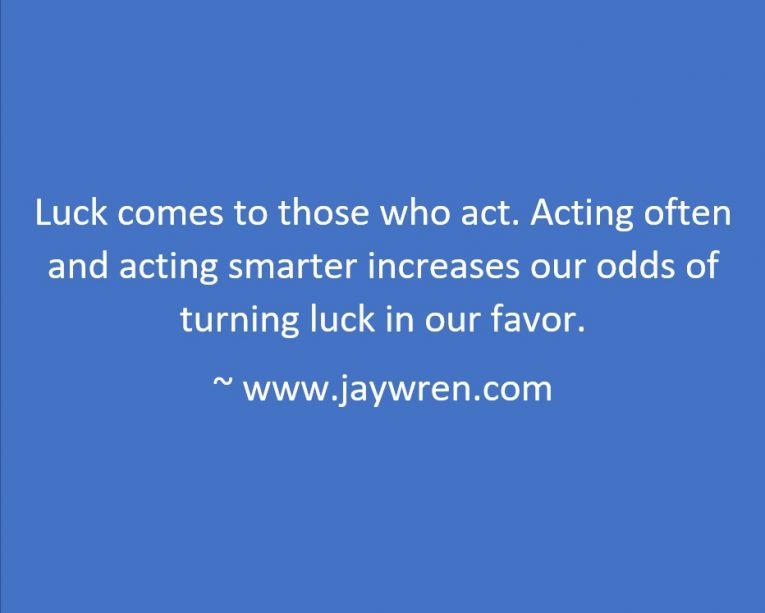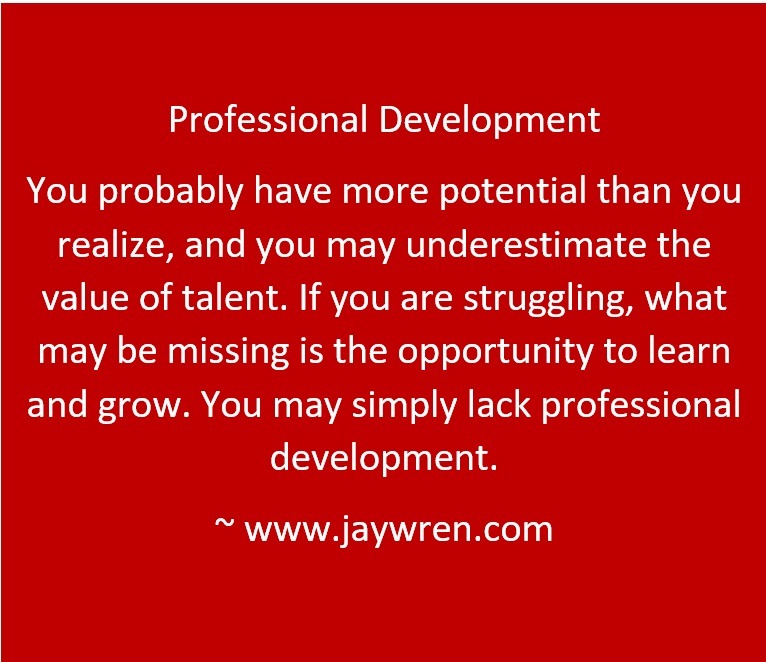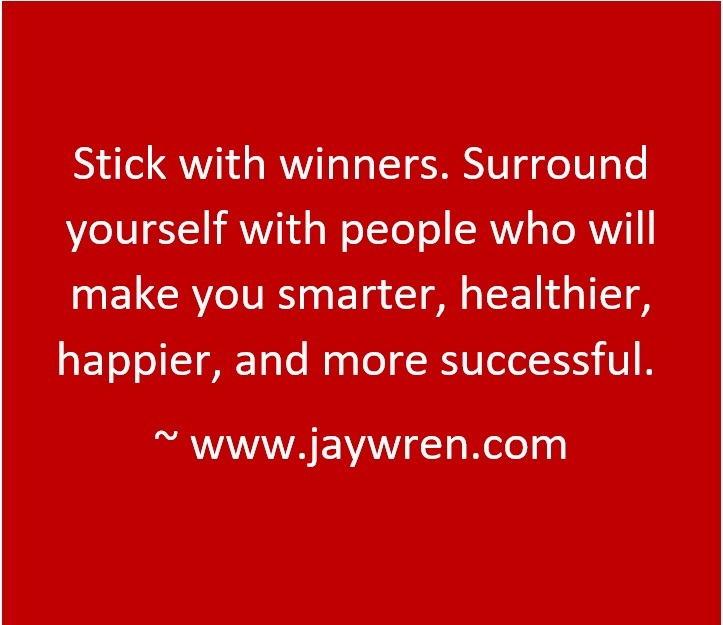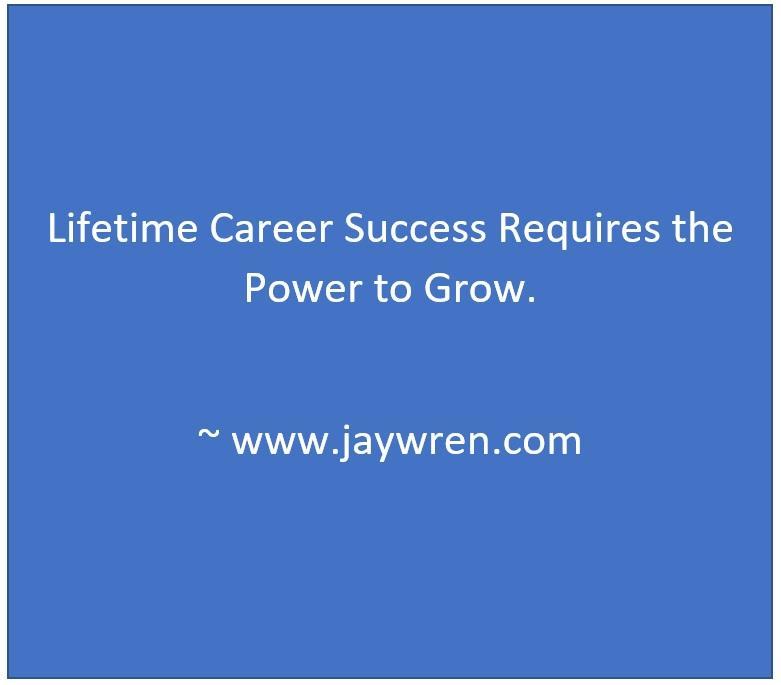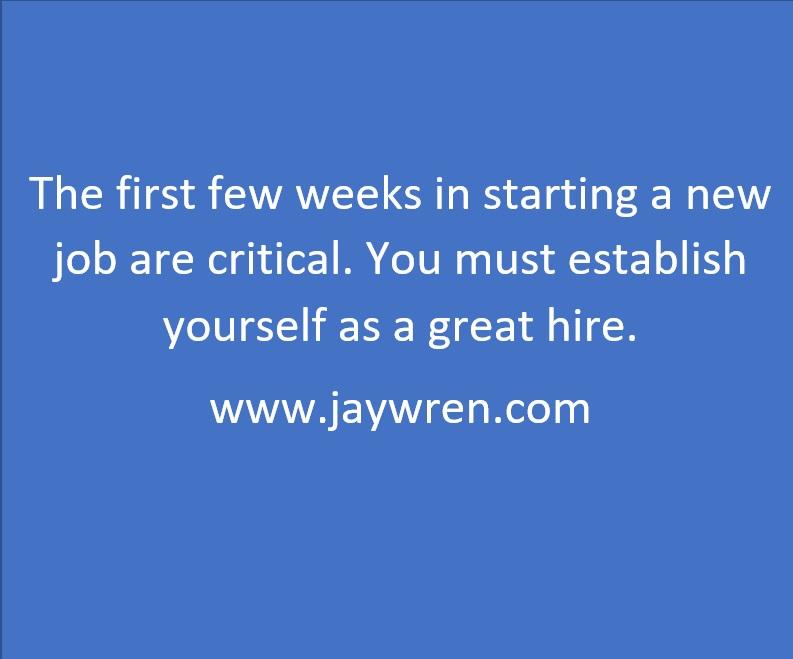Category: Adapt, Innovate, Win
Adapt, Innovate, and Win: Welcome to the cornerstone of jaywren.com, where we believe that career growth is a continuous journey fueled by adaptation and leads to success, both personally and professionally. This category unites the core principles of thriving in a dynamic world with the practical steps for individual development. Here, you’ll find insights and actionable strategies to accomplish these things:
Cultivate an Adaptive Mindset
Learn to embrace change, navigate uncertainty, and develop the resilience needed to thrive in evolving circumstances.
Fuel Personal and Professional Growth.
Explore techniques for self-improvement, skill development, building confidence, and achieving your full potential in all areas of your life.
Embrace Innovation and Creativity.
Discover how to think outside the box, generate new ideas, and implement innovative solutions to overcome challenges and seize opportunities.
Define and Achieve Success
Understand what success means to you and gain practical guidance on setting meaningful goals and developing effective strategies to reach them.
Develop Essential Skills for a Changing Landscape
From communication and leadership to critical thinking and problem-solving, equip yourself with the skills needed to excel in today’s world.
Summary
Whether you’re navigating a career transition, seeking personal fulfillment, or aiming for greater achievements, this category provides the framework and inspiration to adapt, innovate, and win on your unique path to growth and success. Join us as we explore the continuous journey of becoming the best version of ourselves in an ever-evolving world.
Continuing Professional Development: 5 Elements for Continued Growth
Continuing Professional Development and the 5 Elements of Learning.
If you want to become a power performer, you probably have more potential than you realize, and you may underestimate the value of talent. If you are struggling, what may be missing is the opportunity to learn and grow. You are lacking professional development.
Advisors
Nearly everyone has an opinion, but not everyone is an expert advisor.
Expert advisors are not necessarily someone you pay to guide or teach you. They can be friends, relatives, or even people you know through your friends and relatives.
A veteran professional in most fields can help you reach gain understanding and reach decisions. If the person is a professional in the information you need, they can help you make better decisions.
Teachers and professional trainers have credentials or certifications to help you with information. Great teachers and trainers are expert advisors.
In closing, advisors help you with professional development as they help you to grow and to make better decisions.
Repetition Training
Training is critical to performance growth. Physical training builds strength, increases agility, and expands the initial response. Mental training increases memory, decision accuracy, and mental quickness. Skills training makes us more effective performers in your career. Growth comes from the repetition of training.
New Interests
Develop new interests. We can continue to grow as we develop and learn from new interests. We don’t have to be an expert in every field, but we can grow as professionals as we learn more about changes happening in our professional life.
Location
Choosing the right location is critical to our continued growth. If a person wants to become a downhill skier but can never get to a place to ski, the person needs to change the setting to carry out the goal. Likewise, writers, engineers, doctors (that is, people of all professionals) grow when they put themselves in locations that provide for success.
Setting
Additionally, setting is critical to success. In the best setting, we can have better focus. If a person does not pay attention and must go over material several times to get the point, the person may never understand the material at all. If a person does not have focus when performing a task, just doing the task correctly is impossible. Setting aside distractions help us create greater focus and increase learning. Therefore, the best setting is the one that makes easier to focus.
Continuing Professional Development
We must grow to stay current with changes in our industry. Additionally, it is not enough that we can do our job. We must be able to do a better job than current and new workers entering the workplace. Professional development will may our jobs easier and less stressful. It will increase our competence and our confidence.
Remember, if you want to become a power performer, you probably have more potential than you realize, and you may underestimate the value of talent. If you are struggling, what may be missing is the opportunity to learn and grow. You may lack professional development. #ProfessionalDevelopment
Stick with Winners For Personal and Professional Success
Stick with winners. Surround yourself with people who will make you smarter, healthier, happier, and more successful.
Personal and Professional Life
In your personal and professional life, surround yourself with winners. Learning how these people have become successful and remain successful can help you learn how to build success in your own personal and professional life.
Networking
Additionally, these successful people can help you network with other successful people. On a broader basis join groups full of successful people.
On many levels throughout your career, your network of successful people can open doors to new opportunities for greater success.
Winners and Setbacks
Everyone has setbacks. Successful people have experience in overcoming setbacks. Through their experience, they can provide you with mental and emotional guidance. They can inspire us to be successful again. Often, these people have experience and knowledge in dealing with situations that challenge us. They can become practical guides or advisors in tackling challenging situations and overcoming setbacks.
Winning Teams
If we are the team leader, pick winners for your team. Add people who have experience and skills that add to your own experience and skills. Even, hire people who are smarter than you. These people will only help you make better decisions. As they grow, reward them with positive reviews and opportunities for promotion. Remember that someday these people may be able to help you move up in your career.
Winners in Your Personal Life
Outside of work, stick with winners who are your friends.
I have friends and mentors who are doctors, attorneys, members of the clergy, engineers, bankers, contractors, state administrators, chemists, judges, athletes, and others. I became friends with these people, because I enjoy their company. These people are interesting and intelligent people and teach me many things within the scope of their profession.
However, I do not pick my friends for their professional advice. My friends are people with whom I bond over common interests.
I have had occasions when my friends have provided me with professional services. I met them in their office for professional purposes. One friend wrote my will. Another wrote an employment contract. Another friend became my primary care physician. For these purposes, I paid these people and met them in their office.
On the other hand, I have friends who have the knowledge to point me in the right direction. For example, one friend who is a doctor, during lunch, recommended that I see a dermatologist.
A second friend who is a chemist calmed my fears about my liability over a fire that broke out in one of my offices. I was anxious about the damage to a building from the sprinkler system. He said that the fire department would likely find the cause of the fire and that my business could not have caused that fire.
As it turned out, the fire investigators found that a smoker had thrown a cigarette into a waste paper basket and started the fire. The fire activated the ceiling sprinkler system, which had immediately extinguished the fire before the evidence (the cigarette butt and the trash) had completely burned in the basket.
Another example is that my friend who is a senior state administrator is terrific in negotiations and has helped me work through more than one difficult discussion with clients and other friends.
Stick with Winners
As you pick your friends around the office and after work, pick people who can help you grow as a professional and as a person. I have found that picking friends in this way has made my life more fun, more interesting, and has helped me through countless challenging situations.
Lifetime Career Success Requires the Power to Grow
Lifetime Career Success: Building a successful career is a continual process of expanding your skills and your network. Don’t fear change. Embrace it.
Move beyond your comfort zone. Self-doubt is a sign that I am growing. With growth, I gain greater confidence and marketability.
The Texas Ice Houses
At one time, ice houses sold one thing: ice. People who could afford them, had cabinet ice boxes that held large blocks of house. With the invention of the refrigerator, the need to buy ice for the ice box disappeared. In most cases, these ice houses disappeared. However, in Texas, some ice houses survived the changed. They became open air public gathering places where people could sit and have cold drinks and salty snacks. Many offered sandwiches and burgers.
In my career as a recruiter, I saw rapid changes in my industry. Through mergers and acquisitions, an industry that once had thousands of companies evolved into an industry that had fewer and yet larger companies.
However, advances in technology created new potential clients with companies in marketing services and market research. I responded with an increase in my focus to these new companies.
Starting and Evolving
The first day that I sat down to start my career as a recruiter, I had no contacts. I had a telephone, an empty legal pad, and a box of blank 5 x 8 index cards.
On the other hand, my client base continued to broaden to include companies that you might consider for your career. Here are segments of industry where I recruited.
Marketing Services and Market Research Companies, Adult Beverage Companies, Soft Drink Companies, Food Products companies, Confection Companies, Household Products Companies, Cosmetics Companies, Food Brokerage Companies, Personal Care Products Companies, Natural Foods Products, Personal Products Companies, Apparel Companies, Photographic Products Companies, Battery Companies, Power and Hand Tools Companies, Yard and Garden Companies, Over the Counter Pharmaceutical Companies, Snack Foods Companies, Cosmetic Companies, Snack Foods Companies
Lifetime Career Success
To stay in business, I had to continue to grow with new clients and new candidates who had different skills.
Yes, companies still come and go. People come and go, often into other industries and, sometimes, smaller jobs. Processes change. However, people who build new skills and expand their relationships will build security.
7 Steps to Starting a New Job
Starting a new job: The first few weeks in starting a new job are critical. You must establish yourself as a great hire. Moreover, while people are forming impressions of you as a new hire, you are faced with many challenges. To deal with the challenges, the first step is learning what to expect. The second step is learning how to prepare for and handle new situations.
Here are steps for gaining support and respect at your new job.
In your new job seize upon small wins.
You bring with you experience, qualifications, and skills. Use those traits and skills to draw positive attention to you. If there is a task or project that enable you to shine, take on these responsibilities. Some of these small wins can relieve you of the pressure of succeeding in areas where you feel more challenged.
Impress your boss.
Do the job your boss expects you to do. Make your number one priority to do the things that your boss has told you to do and in the order in which your boss directed you. Let your boss know when you complete each task. When you are giving your boss more information than you need to give, your boss will let you know.
Build positive relationships.
Create a chart of the organization. Learn who does what and who reports to which person. Treat everyone with respect. Do not poison a relationship with anyone. You may later learn that the maintenance manager is a scratch golfer who is the golf partner with a board director at the annual company golf tournament. However, do not waste your time listening to everyone who wants to talk with you. Forge relationships with people who can help you with a successful start.
Some of the people who are junior to you will help you understand your job and your new company.
Moreover, turn to others for their experience and intelligence. Often, they will bond with you over your interest in seeking their help.
Write it down.
Make a list of the names, the contact information, the jobs, and the relationships of the people you meet. When your boss tells you to do something, write it down. Write the task and the action date.
Get in step.
The first weeks of the new job are an orientation. You will meet new managers, new co-workers, and, perhaps, new people who work on your team. You will learn the details of your responsibilities. Moreover, you will get a measure of the authority you have in managing your new responsibilities.
Learn the company culture and way of doing things. Do not try to change things until you have established yourself in the job for which your company hired you.
Become a sponge.
Avoid giving your opinion when you can listen and learn. You don’t have to try to prove how smart you are.
Be open to new ideas.
A dangerous pitfall for experienced people is to do things the way they did them at their former employer.
For example, when I entered sales in the consumer products industry, I sold facial tissue, bathroom tissue, and disposable diapers. Except for facial tissue, the products I sold were daily consumer goods. Consumer demand was the same throughout the year.
When I left that company, I went to a company that sold cameras and film. The transition for me required adapting to different selling cycles and new methods of projecting sales. During the holidays, the photography retailers would sell as much in a day they sold in a month during non-holidays. A day of film sales during the holidays was a great as a month of sales the rest of the year.
Thinking: Learning how to Manage the Pain Between our Ears
Thinking: Happiness is easy when everything is going our way. However, we can suffer, even when have everything we want. By managing our thinking, we can find joy from learning how to think about our world.
Thinking: Learning how to Manage the Pain Between our Ears
Being happy is a normal. Staying unhappy is not. www.jaywren.com
Traditionally, we see our thoughts in three categories: the past, the present, the future. I add another category: the flow.
Ruminating
Ruminating about or regretting the past is painful. Additionally, filling our heads with anger over the past is enticing. We can imagine how we could have said or done things to people whom, we believe, have harmed us. Rather than allowing the past to haunt us, we can process these thoughts by taking simple steps to change our thinking. Simply taking a deep breath can change our thinking. Also, getting into action can change our focus. Take a walk. Finish a task we have been putting off. Writing a gratitude list put us into action mentally and can alter our mood.
Worrying
Worrying is a thief of our joy and clarity. We see problems as insurmountable. Worrying about the future steals our energy. Additionally, worrying clutters our mind. Rather than worrying, we can write about our concerns. From there, we can seek advice. Additionally, we can create a plan to see solutions. We might find that clearing our minds, we can see that we have options. Even when faced with unavoidable problems, we can prepare to meet them. Preparation builds confidence and helps us we that we will have the wisdom to deal with frightening situations.
Here are things that help me feel happy return to clarity and relief. First, can we simply let the feelings pass? Thinking about the unhappy experience heightens our unhappiness. Even years later, when we think of bad experiences, the unhappy feelings can return. Therefore, not thinking about the cause of our unhappiness allows us to find happiness and return to the present moment. A process for letting feelings pass is to sit with a feeling and focus on the feeling, not the things that we think are causing our unhappiness.
Second, can we change things that make us unhappy? If we can, we can concentrate on solutions and not the problem.
Present Moment
Thinking is still necessary. Sometimes diligent thinking is necessary. When I learn new skills, I must carefully think about what I am doing. I am in the present moment. But as I become more skillful, I move from the present moment to the highest level of thinking.
Flow
Returning the present moment is simple. We can focus on the things in front of us. An even higher level of thinking is living in the flow. Some people call this psychological condition “the zone.”
We stop thinking. We just move through time and action without analysis or distraction.
When I was a Navy officer, standing bridges watches was stressful. I commanded a watch team to keep the ship on course and speed. Additionally, I made changes in course and speed to keep the ship safe and on task. At first, I did a great deal of analytical thinking. As I became for capable, I was no longer analyzing. I simply performed.
Today, when I am writing I often find that my thoughts become like a flow. In those moments, I feel peace. My vigilance turns to a simple awareness of what is happening and what to do.
